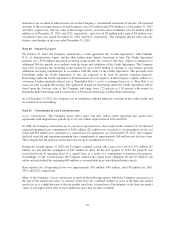Yahoo 2012 Annual Report Download - page 109
Download and view the complete annual report
Please find page 109 of the 2012 Yahoo annual report below. You can navigate through the pages in the report by either clicking on the pages listed below, or by using the keyword search tool below to find specific information within the annual report.
with Alibaba Group’s restructuring of its subsidiary Alipay and related disclosures. On June 7, 2012, the courts
approved stipulations staying the California Derivative Litigation pending resolution of the Federal Derivative
Litigation, and deferring the Federal Derivative Litigation pending a ruling on the motion to dismiss filed by the
defendants in the related stockholder class actions, which are discussed below.
Since June 6, 2011, two purported stockholder class actions were filed in the United States District Court for the
Northern District of California against the Company and certain officers and directors of the Company by
plaintiffs Bonato and the Twin Cities Pipe Trades Pension Trust. In October 2011, the District Court consolidated
the two actions under the caption In re Yahoo! Inc. Securities Litigation and appointed the Pension Trust Fund
for Operating Engineers as lead plaintiff. In a consolidated amended complaint filed December 15, 2011, the lead
plaintiff purports to represent a class of investors who purchased the Company’s common stock between
April 19, 2011 and July 29, 2011, and alleges that during that class period, defendants issued statements that
were materially false or misleading because they did not disclose information relating to Alibaba Group’s
restructuring of Alipay. The complaint purports to assert claims for relief for violation of Section 10(b) and 20(a)
of the Exchange Act and for violation of Rule 10b-5 thereunder, and seeks unspecified damages, injunctive and
equitable relief, fees and costs. On August 10, 2012, the court granted defendants’ motion to dismiss the
consolidated amended complaint. Plaintiffs have appealed.
Mexico Matter. On November 16, 2011, plaintiffs Worldwide Directories, S.A. de C.V. (“WWD”), and Ideas
Interactivas, S.A. de C.V. (“Ideas”) filed an action in the 49th Civil Court of Mexico against the Company,
Yahoo! de Mexico, S.A. de C.V. (“Yahoo! Mexico”), Yahoo International Subsidiary Holdings, Inc., and Yahoo
Hispanic Americas LLC. The complaint alleged claims of breach of contract, breach of promise, and lost profits
in connection with various commercial contracts entered into among the parties between 2002 and 2004, relating
to a business listings service, and alleged total damages of approximately $2.75 billion. On December 7, 2011,
Yahoo! Mexico filed a counterclaim against WWD for payments of approximately $2.6 million owed to Yahoo!
Mexico for services rendered. On April 10, 2012, plaintiffs withdrew their claim filed against Yahoo
International Subsidiary Holdings, Inc. and Yahoo Hispanic Americas LLC.
On November 28, 2012, the 49th Civil Court of Mexico entered a non-final judgment against the Company and
Yahoo! Mexico in the amount of USD $2.75 billion and a non-final judgment in favor of Yahoo! Mexico on its
counterclaim against WWD in the amount of $2.6 million. The judgment against the Company and Yahoo!
Mexico purports to leave open for determination in future proceedings certain other alleged damages that were
not quantified in the judgment. The judgment was issued by a law clerk to the trial court judge who presided over
the entire case during the trial court proceedings but stepped down from his position shortly before the judgment
was entered.
On December 12, 2012 and December 13, 2012, respectively, Yahoo! Mexico and the Company appealed the
judgment to a three-magistrate panel of the Superior Court of Justice for the Federal District (the “Superior
Court”). The appeals must be heard as a matter of law and are pending.
The Company believes the plaintiffs’ claims are without legal or factual merit. First, the plaintiffs’ claims are
based on agreements that were either terminated by agreement with releases or had expired or terminated in
accordance with their terms, a non-binding letter of intent pursuant to which no definitive agreements were ever
entered into by the parties, and correspondence that did not constitute agreements. Second, the loss of profits of
the type claimed by plaintiffs are not awardable under Mexico law because they were not a direct and immediate
consequence of a breach of contract. Of the $2.75 billion in total damages alleged by plaintiffs, more than $2.4
billion were for loss of profits. Third, the plaintiffs’ alleged damages and loss of profits were further precluded
by the agreements at issue through, among other things, contractual and legal limitations of liability. Fourth, the
plaintiffs’ pleadings in the complaint, as well as documentary evidence filed by the plaintiffs in support of their
allegations, were generally deficient to support or establish plaintiffs’ claims. Fifth, the decision failed to
consider substantially all of the defenses asserted by the Company and Yahoo! Mexico. Finally, the Company
believes that the law clerk who entered the judgment lacked the requisite authority to issue the judgment.
95
























